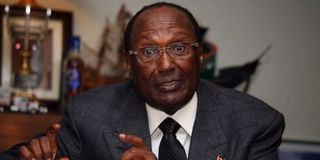Premium
Chris Kirubi, the Kenyan oligarch

The late business tycoon Chris Kirubi.
What you need to know:
- As one leader after another took the lectern to sing Hosanna to Kirubi, the truth about who actually runs – nay, rules – Kenya was revealed.
- Raising their voices to outdo each other about Kirubi’s exploits, the politicians let us see the godforsaken entrails.
Politicians don’t usually tell the truth at funerals. But sometimes – on rare occasions – they become giddy and do so by accident. That’s what happened at the funeral last week of the late business oligarch Chris Kirubi. The country’s most senior political leaders inadvertently let it all hang out. It was a stunning display of political obsequiousness only last seen at the burial of the late dictator Daniel arap Moi. Except Kirubi wasn’t a politician, and never held any elective public office. However, he had amassed a lot of moolah. At one point, Forbes ranked Kirubi only second to the Kenyattas in wealth in Kenya. They say money talks, and the other stuff walks. That’s raw power.
It’s not Kirubi’s wealth that concerns me. Although that’s an issue. Kenya has chosen the path of bare-knuckle capitalism where the primitive accumulation of wealth – even by crook – is admired and celebrated. In Kenya, you are morally inferior if you are impoverished. Rather, I am concerned about how Kirubi acquired and used his vast riches. We know he was born and grew up dirt poor. That’s why he’s a classic study of how one can hitch themselves to the state and the ruling elite to become an oligarch. Eventually, Mr Kirubi became the state, or the deep state, if you wish. Politicians, including presidents, genuflected to him. His moneyed tentacles reached far and wide in East Africa.
Unlike Mark Antony at the funeral of Julius Caesar, I’ve come neither to bury nor praise Kirubi. As a pundit, I only bear witness to what I see. And what I saw at the entombment of Kirubi is an eye-opener. It’s one of those moments when the clouds part and you can see every star in the galaxy far, far way.
Classic oligarchy
As one leader after another took the lectern to sing Hosanna to Kirubi, the truth about who actually runs – nay, rules – Kenya was revealed. I don’t even think the politicians knew they were giving away state secrets. Raising their voices to outdo each other about Kirubi’s exploits, they let us see the godforsaken entrails. The term oligarch isn’t one of endearment. Nor is the designation of a country as an oligarchy. It’s a country where a small, usually shadowy and opaque group wields all the power under a dictator, or an illiberal state. President Vladimir Putin’s Russia is the classic oligarchy.
In Russia, Mr Putin is oligarch number one. The oligarch – whether political or in business – is a godfather whose word is law. Most oligarchs are unelected and wield their power in the economy with the protection of the state. They are fused at the hip with the state. That’s why they are the Deep State. Elected political leaders – especially in illiberal democracies – are peons and putty in the hands of oligarchs.
The political funeral speeches “celebrating” Kirubi evidence an oligarch. Wiper’s Kalonzo confessed how Kirubi made him VP. I had thought all along it was PNU’s Mwai Kibaki who made him VP. ODM’s Raila Odinga revealed it was Kirubi who ended the 2007 post-election violence by convincing him to strike the deal with Mr Kibaki. Businessman Polycarp Igathe disclosed that it was Kirubi who crafted the Sonko-Igathe ticket to take Nairobi in 2017. Mr Igathe said Kirubi was the brains behind putting Nairobi under General Mohamed Badi and NMS. Ford-Kenya’s Moses Wetang’ula said as foreign minister, he took the oligarch to Ethiopia to PM Meles Zenawi to plead for favours for his private business.
Rags-to-riches story
No one can begrudge any citizen from seeking to influence the politics of their country. That’s an obligation of citizenship. But it’s quite a different matter for unelected oligarchs to run the government from the shadows.
It’s disturbing when oligarchs become the puppet masters of the political class. The official slogan of the Washington Post is that “Democracy Dies in Darkness”. That’s what happens when states shut down free media, or allow moneyed moguls to run the state out of the sight of the electorate. Why should citizens cast ballots if one – a single – oligarch can walk into the inner sanctum of power and make major policy. How many other oligarchs are there in Kenya apart from Kirubi?
The word quid pro quo is Latin for “this for that”. Scratch my back and I will scratch yours. Oligarchs don’t do anything out of altruism unless there’s something in it for them. Even charitable works are driven by selfish interests. Question: what have Kenyan oligarchs got – and given in return – for the mutual favours between them and public officials? How have oligarchs enriched themselves by advocating policies that favour them? Many people, including Amani’s Musalia Mudavadi who confessed Kirubi would publicly call folks “stupid”, were inspired by his rags-to-riches story. Is that all there is? We need to know more. Importantly, we need to eviscerate oligarchs.
Makau Mutua is SUNY Distinguished Professor and Margaret W. Wong Professor at Buffalo Law School. He’s chair of KHRC. @makaumutua





